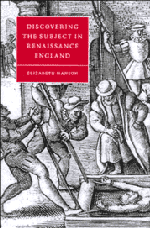3 - Brothers of the state
Published online by Cambridge University Press: 21 October 2009
Summary
Shepherds of the people had need know the calendars of tempests in state, which are commonly greatest when things grow to equality, as natural tempests are greatest about the Equinoctia.
Francis Bacon, “Of Seditions and Troubles”The Renaissance English stage is notorious for its violent corporeality, its display of stabbings, dismemberments, eye gougings, boilings, and other atrocities. But there is, to my knowledge, no scene of interrogatory state torture in the drama of this period. Like the spectacle of execution, official torture apparently could not be played at, its motions divorced from the power they proclaim, its deadly force mocked through representation. The rack, that potent symbol of the state's compulsion to wring truth from the subject, does appear on stage on at least one occasion, however, in Chapman's Bussy d'Ambois (1604), when the jealous husband Montsurry uses it to interrogate his adulterous wife Tamyra. The scene presents a bizarre overlay of state violence and domestic crisis, one which entails a double displacement of social reality, for, with apparently only two exceptions, victims of interrogatory torture in England were men, while wives suspected of adultery were rarely of interest to the state and generally met with more banal forms of domestic violence. The introduction of the rack into the scene of marital crisis thus produces a semiotic disturbance which signals that whatever we are looking at here, it is not simply mimesis, either of domestic strife or of state power.
- Type
- Chapter
- Information
- Discovering the Subject in Renaissance England , pp. 55 - 91Publisher: Cambridge University PressPrint publication year: 1998

